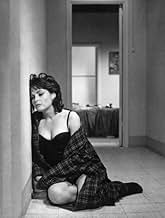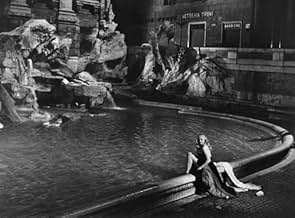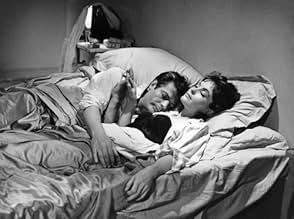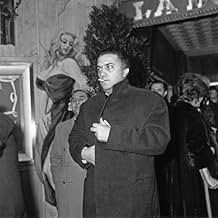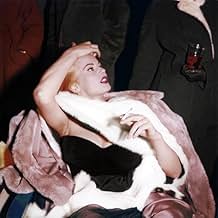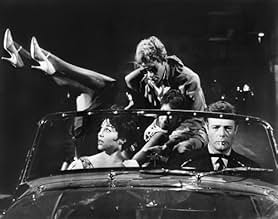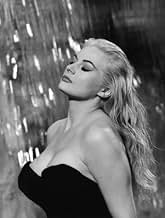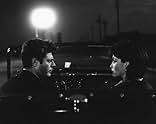La dolce vita
- 1960
- Tous publics
- 2h 54m
A series of stories following a week in the life of a philandering tabloid journalist living in Rome.A series of stories following a week in the life of a philandering tabloid journalist living in Rome.A series of stories following a week in the life of a philandering tabloid journalist living in Rome.
- Won 1 Oscar
- 11 wins & 12 nominations total
Anouk Aimée
- Maddalena
- (as Anouk Aimee)
Magali Noël
- Fanny
- (as Magali Noel)
Summary
Reviewers say 'La Dolce Vita' delves into themes of fame, decadence, and the superficiality of celebrity culture, using these characters to underscore the contrasts and contradictions within high society. The portrayal of it's characters enhances the film's satirical and critical perspective on the lifestyles and attitudes of the era, offering a nuanced commentary on the nature of fame and its impact on individuals and society.
Featured reviews
This is one of those films where I just don't want it to end as I enjoyed it so much. So many memorable and humorous scenes - Fellini successfully captured the atmosphere of picturesque Rome lifestyle. All of the characters are interesting, complex and I especially loved Anita Ekberg's performance! Amazing!
Mostly because of the terrific high contrast, B&W visuals, and the evocative music, this is the only Fellini film I have seen that I have somewhat enjoyed. I recommend it, but not without reservations. It's a complex film with many textured layers of meaning. And, in typical Fellini fashion, it rambles and it meanders.
Deviating from standard three-Act structure, Fellini's story consists of roughly eight episodes, all starting at night and ending at dawn, more or less. Each has its own crisis. And the only thing that unites these episodes into a coherent whole is the story's protagonist, Marcello (Marcello Mastroianni). In his job as a journalist and overall observer of human nature, Marcello encounters people in high society who seem outwardly happy and self-fulfilled. On closer examination, however, these people are empty, hollow, alienated, emotionally adrift and vacant.
A good example is the starlet Sylvia (Anita Ekberg), a glamorous figure, but she's all image and no substance. "La dolce vita" is the first film that uses the concept of "paparazzi", which implies the importance of "image", separate from substance.
Throughout the various episodes Marcello sees these "images" of happiness, of contentment, but the images are deceptive, elusive, unreliable. In one episode, two "miracle" children "see" the Madonna. "The Madonna is over there", shouts one child. The crowd chases after her. But the other child who "sees" the Madonna runs in the opposite direction. Happiness, self-fulfillment, religious visions ... they're all a will-o'-the-wisp. And so, the film conveys a sense of pessimism and cynicism.
The film thus has deep thematic value. It caused a scandal when it was released, and was banned by the Catholic Church, apparently for appearing to be anti-religious.
Yet for all its deep meaning, "La dolce vita" can be a trial to sit through. Somewhere in the second half I began to lose interest. I don't have a problem with Fellini's deviation from standard plot structure. I do have a problem with a director who doesn't know when to quit. This film goes on for almost three hours. A good edit, to delete all the fat, would have tightened up the story and rendered it more potent. As is, it's too strung out, too stretched, too meandering.
If the viewer can persevere, there's enormous cinematic art in this film. And helped along by Nino Rota's music, the film is wonderfully evocative, at times stylishly melancholy.
Deviating from standard three-Act structure, Fellini's story consists of roughly eight episodes, all starting at night and ending at dawn, more or less. Each has its own crisis. And the only thing that unites these episodes into a coherent whole is the story's protagonist, Marcello (Marcello Mastroianni). In his job as a journalist and overall observer of human nature, Marcello encounters people in high society who seem outwardly happy and self-fulfilled. On closer examination, however, these people are empty, hollow, alienated, emotionally adrift and vacant.
A good example is the starlet Sylvia (Anita Ekberg), a glamorous figure, but she's all image and no substance. "La dolce vita" is the first film that uses the concept of "paparazzi", which implies the importance of "image", separate from substance.
Throughout the various episodes Marcello sees these "images" of happiness, of contentment, but the images are deceptive, elusive, unreliable. In one episode, two "miracle" children "see" the Madonna. "The Madonna is over there", shouts one child. The crowd chases after her. But the other child who "sees" the Madonna runs in the opposite direction. Happiness, self-fulfillment, religious visions ... they're all a will-o'-the-wisp. And so, the film conveys a sense of pessimism and cynicism.
The film thus has deep thematic value. It caused a scandal when it was released, and was banned by the Catholic Church, apparently for appearing to be anti-religious.
Yet for all its deep meaning, "La dolce vita" can be a trial to sit through. Somewhere in the second half I began to lose interest. I don't have a problem with Fellini's deviation from standard plot structure. I do have a problem with a director who doesn't know when to quit. This film goes on for almost three hours. A good edit, to delete all the fat, would have tightened up the story and rendered it more potent. As is, it's too strung out, too stretched, too meandering.
If the viewer can persevere, there's enormous cinematic art in this film. And helped along by Nino Rota's music, the film is wonderfully evocative, at times stylishly melancholy.
Returning to this film after many years, I was mesmerized for its entire three hours and could have stuck with it for even longer. More than just a parade of degenerate Sixties Eurotrash, all of human life is captured in these frames, from prostitutes living in flooded slum apartments to glittering nobility in their crumbling castles.
The common thread is the thoroughly captivating Marcello Mastroianni as the gossip columnist/aspiring novelist, later turned burned-out publicist. His relationship with the parade of females who inhabit his world, often fleetingly, is nuanced and authentic feeling, while the episode with his father, who shows up for an unexpected visit, is a delight that brought a wide smile to my face.
The unique, episodic structure of the film feels neither showy nor forced, and the film moves through its segments with the natural grace of a great symphony.
An added bonus for me was seeing a young Nico of Velvet Underground fame , looking relaxed and happy. Would that things always turned out that way for her.
In sum, a totally unique tour de force and, unquestionably, one of the greatest achievements in cinematic history.
The common thread is the thoroughly captivating Marcello Mastroianni as the gossip columnist/aspiring novelist, later turned burned-out publicist. His relationship with the parade of females who inhabit his world, often fleetingly, is nuanced and authentic feeling, while the episode with his father, who shows up for an unexpected visit, is a delight that brought a wide smile to my face.
The unique, episodic structure of the film feels neither showy nor forced, and the film moves through its segments with the natural grace of a great symphony.
An added bonus for me was seeing a young Nico of Velvet Underground fame , looking relaxed and happy. Would that things always turned out that way for her.
In sum, a totally unique tour de force and, unquestionably, one of the greatest achievements in cinematic history.
I first saw this movie probably over 25 years ago when I was quite a bit younger. At that point I enjoyed it for its party scenes, sense of joy and life and vitality and....Marcello Mastroianni. Now that I'm older myself and have just recently seen the movie again, I find that I have a much deeper understanding of it. Maybe it takes some age to find some meaning. In a nutshell, Marcello is at a crossroads in his life, he's unable to settle down or move foreward into any direction - he's a diletante with aspirations but no real goals. He's wrapped up in himself and in projecting rather dreamy ideals onto other people. But as he keeps projecting on to others he comes to find in each situation that he doesn't really know the person and they are a mystery and probably a disappointment to him. certainly steiner is the biggest disappointment and disillusions him to a degree that he is apparently lost to a life of corruption and decadence as a result. but it's not that these people are difficult to understand to someone other than marcello - i think we can see that anita ekberg's character really is just a big good-natured blond and not the mysterious goddess marcello makes her out to be; his father is again - the typical traveling salesman and perhaps not the paternal figure that marcello would like him to be. his amour maddelena lives up to her name even as marcello starts believing himself in love with her - he's literally seduced by nothing more than an image he creates in his own mind. his friend steiner seems to have it all to marcello and to be the renaissance man that he would like to be - but, of course, he is dissatisfied and disturbed and we see what the end is. the only one whom marcello forms a somewhat realistic connection with is his girlfriend whom he treats badly and neglects despite her obvious love for him. he refuses to actually work on the one relationship that he could actually succeed at - he would rather dream about possibilities than actualize something.
marcello cannot communicate with others because he cannot see them as the people they really are - he just sees them as projections of his own needs, aspirations, desires and goals. when he finds out what they're really like, he either turns away or falls apart. this is an outstanding movie - 10 out of 10 and beautifully photographed. if you don't get it now, try again in 10 years - it will wait for you to catch up.
marcello cannot communicate with others because he cannot see them as the people they really are - he just sees them as projections of his own needs, aspirations, desires and goals. when he finds out what they're really like, he either turns away or falls apart. this is an outstanding movie - 10 out of 10 and beautifully photographed. if you don't get it now, try again in 10 years - it will wait for you to catch up.
There really isnt a plot. This is about a tabloid photographer and some scenarios he gets into. All the characters seem vain, selfish and wanting more from life without actually knowing what they want. The Rome nightlife is brought to life here and there are many scenes at lavish parties where all the characters dont appear to have any emotional connection to one another. There are also disconnected Catholic themes throughout the movie. It leaves you questioning your own life and emptiness.
Did you know
- TriviaThe famous scene in the Trevi Fountain was shot over a week in March, when nights were still cold. According to Federico Fellini (in an interview with Costanzo Costantini), Anita Ekberg stood in the cold water in her dress for hours with no trouble. Marcello Mastroianni, on the other hand, had to wear a wetsuit beneath his clothes, and even that wasn't enough. Still freezing, he downed an entire bottle of vodka, so he was completely drunk while shooting the scene.
- GoofsWhen Marcello and Maddalena arrive at the prostitute's apartment, a long electric cable (light?) can be seen attached to the right rear of the car, moving along until the car stops.
- Alternate versionsIn the original American release, distributed by American International Pictures, the titles open with the AIP logo and appear over a shot of the sky with clouds. In the current release on DVD - and as shown on TCM - the title sequence is over a black background. When originally released, censors in several countries trimmed certain scenes, including the orgy near the end of the film.
- ConnectionsEdited into La case du siècle: Cinecittà, de Mussolini à la Dolce Vita (2021)
Details
- Release date
- Countries of origin
- Official site
- Languages
- Also known as
- La douceur de vivre
- Filming locations
- Villa Giustiniani-Odescalchi, Bassano Romano, Viterbo, Lazio, Italy(abandoned castle scenes)
- Production companies
- See more company credits at IMDbPro
Box office
- Gross worldwide
- $217,420
- Runtime
- 2h 54m(174 min)
- Color
- Aspect ratio
- 2.35 : 1
Contribute to this page
Suggest an edit or add missing content

![Watch Trailer [English SUB]](https://m.media-amazon.com/images/M/MV5BNjE3MTU3OTItN2I0NS00YzU2LWE1ZTctZDQ3Y2I1NDc4MGMxXkEyXkFqcGdeQXRyYW5zY29kZS13b3JrZmxvdw@@._V1_QL75_UX500_CR0)
![La Dolce Vita: [2-Disc Collectors Edition]](https://m.media-amazon.com/images/M/MV5BZTY2ZTg3YmEtZDZkMS00MmFkLThhMjItMWVmN2NlNmJhZGZjXkEyXkFqcGdeQXVyNzU1NzE3NTg@._V1_QL75_UX500_CR0)

